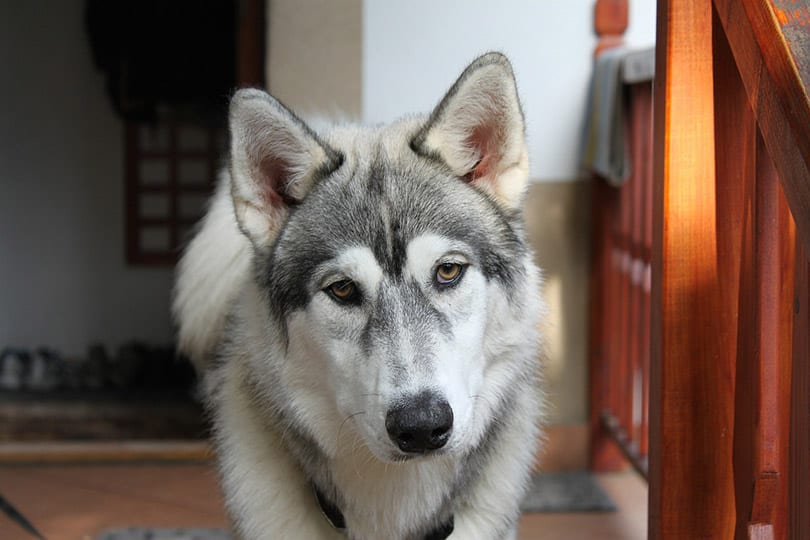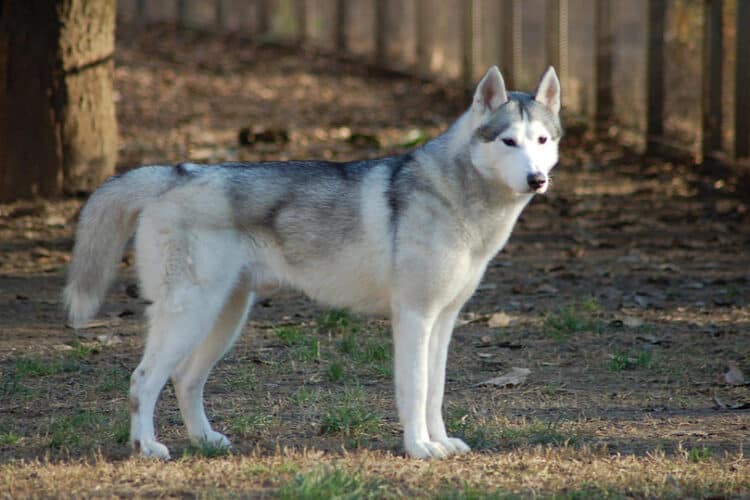Sadly, Siberian Huskies are not hypoallergenic. That said, no dog is truly hypoallergenic. When people experience dog allergies, their immune system is responding to the proteins that dogs create. All dogs create these proteins, as they are found in a dog’s skin, saliva, and urine. Because there are currently no skinless, saliva-less, and urine-less dogs out there, they will all create these proteins.
Let’s take a look at Huskies specifically.
Irritant Response
While it’s a common misconception that hair triggers dog allergies, this isn’t true. With that said, a dog’s fur can cause an irritant response, which is basically where the hair irritates a person’s nose and sinuses. Huskies shed quite a bit, so they can cause an irritant response in those with sensitivities.
An irritant response is not the same as an allergic response. Huskies will trigger both, as do most dog breeds.
Therefore, Huskies likely aren’t a good choice for anyone experiencing dog allergies. They produce a lot of hair, as well as the same proteins that all dogs produce. Those with dog allergies will likely react to a Husky.
With that said, not all dog allergies are the same. Dogs actually create many different types of proteins, and those with dog allergies typically aren’t allergic to all of them. Some proteins may only be found on certain dogs.

Can f Proteins and Their Effect on Allergies
Typically, when the average person is tested for dog allergies, they are tested for an allergy to all dog proteins at once. If they are tested positive, they are told they have dog allergies. However, the truth is often more complicated than that.
There are several proteins dogs make, and not all dogs produce all the proteins, so those with allergies may not be allergic to all dogs.
Studies have found that many with dog allergies are actually only allergic to Can f 5, which is a particular protein made in a male dog’s prostate. As you’d imagine, female dogs don’t create this protein. Neutered male dogs don’t create it, either.
Therefore, if this is the only protein you’re sensitive to, you could potentially own a female or neutered male dog without a problem.
You can determine the exact proteins you’re allergic to by getting a Can f protein test, which tests for different proteins separately. Typically, these are not offered as a rule—you have to ask your immunologist for the test.
Owning a Husky with Dog Allergies
If you have allergies, then you may still be able to own a Husky. There are many things you can do to make owning a husky tolerable, even if you have allergies. In fact, if your allergies are only minor, then you could easily own a Husky by making some lifestyle changes.
Here are some steps you may want to take to limit your allergy symptoms while owning a Husky.
Environmental Controls
Controlling your environment is the easiest thing you can do to control allergy symptoms. Here are some ways to reduce the allergens in your environment, which should reduce your symptoms:
- Bath your dog frequently with an allergy-friendly shampoo
- Use a high-efficiency vacuum daily
- Wash your hands after petting your dog
- Make your bedroom a dog-free zone
- Restrict your dog to only certain parts of your home
- Get a HEPA air filter to remove allergens from the air

Medications
Often, you can also use medications to lower your allergy symptoms. Sometimes, your allergies can be completely controlled by the right medicine. However, you’ll need to work with your vet to determine the best medicine for you.
There are many types of allergy medications. For instance, antihistamines block the chemical that is responsible for many allergy symptoms, such as itching and sneezing. Corticosteroids may also be given as a nasal spray, which reduces inflammation in the nose. Decongestants reduce congestion and help keep nasal passages clear. Usually, your symptoms will determine which medicines will work best.
However, you’ll likely need to experiment with a few different medicines to find one that works best for you.
Immunotherapy
Immunotherapy is a “cure” for dog allergies. Often, it takes about 3–5 years to achieve, and it doesn’t work for everyone. Plus, you’ll have to go into your doctor’s office once or twice a week to receive treatments, which aren’t always paid for by insurance.
However, immunotherapy can greatly reduce your allergy symptoms.
Final Thoughts
Huskies shed a lot, allowing them to produce an irritant and allergy response. However, because those with allergies are allergic to proteins all dogs produce, there really aren’t any hypoallergenic dogs out there. They simply don’t exist.
However, allergies vary. Some people are only allergic to certain proteins, allowing them to own certain dogs without problems. For instance, those with Can f 5 can own neutered male and female huskies, as they don’t produce this protein.
Plus, you can also control your environment and take medication to reduce your symptoms. Sometimes, these two things are enough to eliminate your allergies enough to own a dog.
Featured Image Credit: Pixabay














